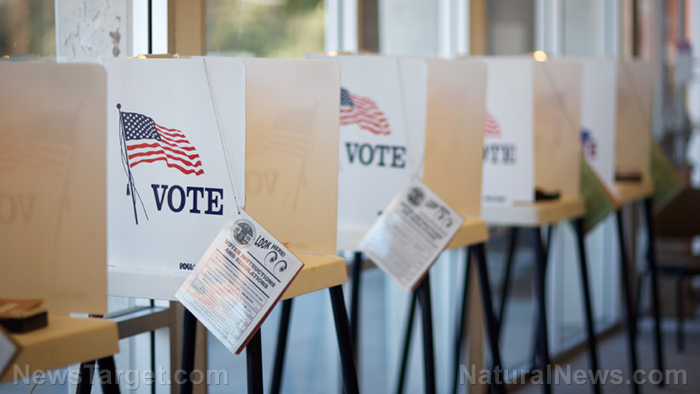Big Brother is here: Governments exploit pandemic to normalize surveillance
12/13/2021 / By Mary Villareal

Citizens of South Korea are giving up their personal data and privacy in exchange for convenience, order and safety. The technology-laden “smart city” being built on the southern coast of the country epitomizes this daily bargain.
Children today are being born into an already digitally interconnected reality where big data and artificial intelligence will shape their everyday existence long before they are old enough to contemplate privacy or give consent.
“The idea that you have any kind of anonymity is rapidly disappearing, in public spaces but also in private life. The way my kids now are being tracked, their medical information, the music they stream, what they watch, all of that is noted and recorded and accessed in different ways,” said Steven Feldstein, a senior fellow at the Carnegie Endowment for International Peace.
The tradeoffs of these were foreshadowed by the Wuhan coronavirus (COVID-19) pandemic when cities and countries decided on how far they can infringe on personal freedoms to protect public health.
South Koreans have a dashboard that collects and analyzes data to improve urban life. The platform was repurposed into an epidemiological tool that allowed contact tracers to target a person’s cellphone location data, credit card usage and other movements in a matter of minutes.
This rapid, meticulous tracking was central to the country’s widely celebrated success at pandemic control. While the U.S. saw over 240 COVID-19 deaths for every 100,000 people, South Korea lost only eight.
Intrusive technology has become part of the new normal as the planet turns living with the virus into a reality.
Jathan Sadowski, a research fellow in the Emerging Technologies Research Lab at Monash University in Australia, noted that the pandemic marks a real inflection point for this kind of intrusiveness.
“Who decides when COVID has gone away? If it’s something that never really truly goes away, those technologies and those systems may never truly go away either,” he said. “As history shows, we very rarely go back to the moment before. Once new doors have been opened, people are reticent to close them.”
The question that many citizens are facing is: How can people keep the same technology that drives the benefits of a “smart city” from jeopardizing civil freedoms?
ADM systems adopted with almost no transparency, adequate safeguards
Since the onset of the coronavirus pandemic, the automated decision-making (ADM) systems were adopted with almost no transparency, adequate safeguards and democratic debate, according to non-profit organization AlgorithmWatch, which tracks ADM systems and their impacts on society.
The Germany-based group warned that the situation regarding ADMs is even worse than before the COVID-19 pandemic began because they now include digital contact tracing apps and digital COVID certificates. The group noted that the adoption of these tools happened fast and without any considerations of potential risks and downfalls.
“It is shocking indeed to witness the same dangerous trends we documented before the pandemic – widespread opacity, insufficient democratic oversight and debate, solutionist assumptions — even when millions of lives are at stake,” said Fabio Chiusi, who serves as the lead for the group’s Tracing the Tracers project.
Chiusi also cautioned that the COVID-19 and mass surveillance adopted in Europe and elsewhere over the last two years are part of an “unprecedented social experiment in health surveillance.” He pointed that thermoscanners and surveillance cameras, assisted by drones and robots, ensure that people were social distancing and abiding by the quarantine rules and regulations. (Related: COVID tracking apps have eerie echoes of Chinese surveillance system.)
The idea that technology can be used to solve complex social issues is not a new one, but the pandemic strongly influenced how technology is applied, with much of the push coming from public health policymaking and public perceptions.
In its new report, the Tracing the Tracers project highlighted the growing divide between people who fervently defend the schemes and those who oppose them, and how fear and misinformation have influenced both sides.
“The trend long precedes the pandemic, and a public health emergency may be framed – and it has been – as the perfect excuse to justify – and even worse, normalize – widespread surveillance, especially in non-democratic contexts. What’s even more worrisome is how little this has been debated in democratic countries as well,” Chiusi said.
ADM-based responses helped tackle COVID-19 in South Korea, the U.S. and elsewhere, but questions still remain over whether these apps and schemes and other related algorithms help nations respond effectively.
Chiusi stressed that future deployments of such technologies must be evidence-based, transparent, clearly limited in scope and duration and should be more democratically discussed.
Read more news related to the coronavirus pandemic at Pandemic.news.
Sources include:
Tagged Under: ADM system, automated decision-making, Big Brother, big government, civil freedom, conspiracy, contact tracing, coronavirus, covid passport, national security, pandemic, privacy, surveillance, tracking, Tyranny, watched
RECENT NEWS & ARTICLES
COPYRIGHT © 2017 CONSPIRACY NEWS





















